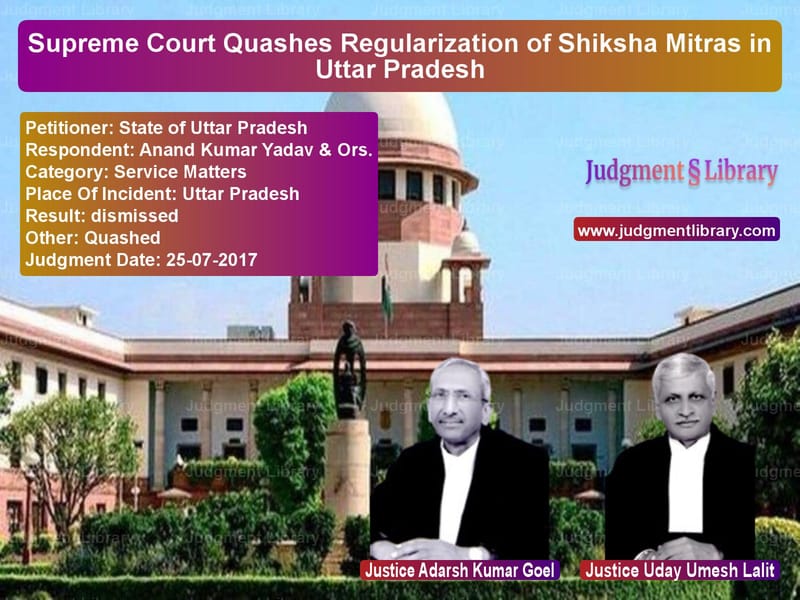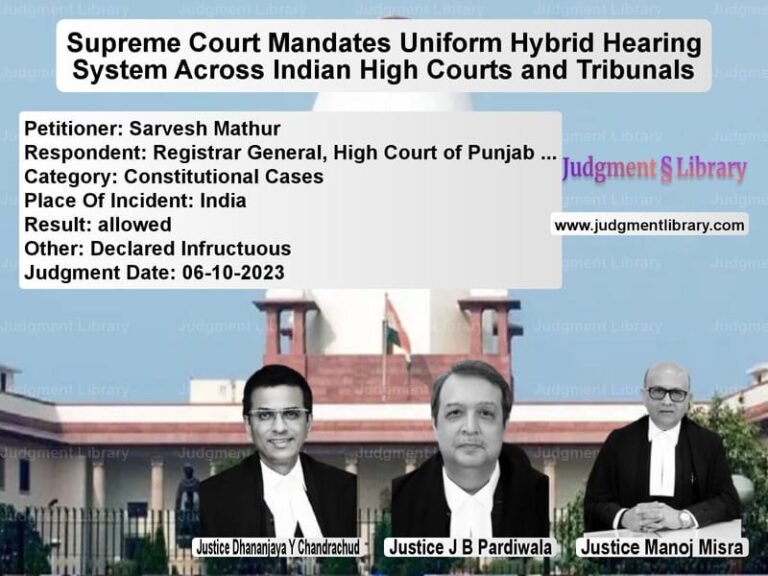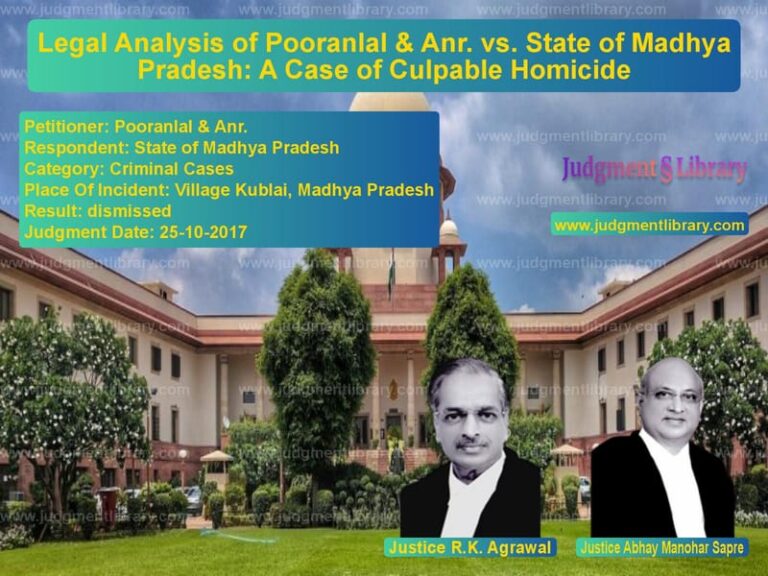Supreme Court Quashes Regularization of Shiksha Mitras in Uttar Pradesh
The case of State of U.P. & Anr. vs. Anand Kumar Yadav & Ors. revolves around the legal challenge to the regularization of Shiksha Mitras (contractual teachers) in Uttar Pradesh. The Supreme Court, in its landmark decision, quashed the Uttar Pradesh government’s move to absorb Shiksha Mitras as regular assistant teachers, ruling that it violated the minimum qualification standards set under the Right of Children to Free and Compulsory Education Act, 2009 (RTE Act).
Background of the Case
In 2014, the Uttar Pradesh government introduced amendments to the recruitment rules to regularize approximately 1.78 lakh Shiksha Mitras as assistant teachers in government schools. This move was challenged in the Allahabad High Court, which ruled against the state government, declaring the amendment unconstitutional. The state government, along with the affected Shiksha Mitras, appealed against the decision in the Supreme Court.
Key Issues Raised
- Whether Shiksha Mitras, who were engaged as para-teachers on an honorarium basis, could be regularized as assistant teachers.
- Whether the minimum qualifications for teachers as prescribed by the National Council for Teacher Education (NCTE) and mandated by the RTE Act could be bypassed.
- Whether the decision of the state government to regularize Shiksha Mitras was in violation of the Constitution and the established service rules.
Petitioners’ Arguments (State of Uttar Pradesh & Shiksha Mitras)
The petitioners argued:
- The Shiksha Mitras had been working for nearly 16 years and had gained significant teaching experience.
- The state government had provided them with training through distance learning programs, which made them eligible for regularization.
- Many states had regularized similar para-teachers, and this policy decision should not have been interfered with by the courts.
- The decision to quash the regularization would affect the livelihood of thousands of Shiksha Mitras and disrupt primary education in the state.
Respondents’ Arguments (Candidates for Regular Teacher Posts)
The respondents, consisting of trained candidates who had cleared the Teacher Eligibility Test (TET), contended:
- The RTE Act, 2009, mandated specific minimum qualifications for teachers, which included clearing the TET.
- The recruitment of Shiksha Mitras without TET qualification was illegal and violated the principles of merit-based selection.
- The Supreme Court had previously ruled in State of Karnataka vs. Uma Devi that temporary or contractual appointments could not be regularized unless made in compliance with constitutional requirements.
- The High Court had correctly ruled that the absorption of Shiksha Mitras was unconstitutional and violative of service rules.
Supreme Court’s Analysis and Judgment
The Supreme Court upheld the decision of the Allahabad High Court and ruled against the regularization of Shiksha Mitras. The Court made the following key observations:
1. Violation of the RTE Act and NCTE Guidelines
The Court emphasized that the RTE Act mandates minimum qualifications for teachers to ensure quality education for children. The judgment stated:
“No state government has the power to dilute or bypass the statutory qualifications mandated under Section 23 of the RTE Act. The requirement of passing the TET is essential and cannot be ignored.”
2. Lack of Merit-Based Selection
The Court noted that the recruitment process for Shiksha Mitras did not follow the proper selection criteria. Unlike regular assistant teachers, they were not required to clear the TET. The Court ruled:
“The selection process for Shiksha Mitras was not conducted through a transparent and competitive process. Regularization without the prescribed qualifications would violate the principles of equal opportunity in public employment.”
3. Precedent from Uma Devi Case
The Court referred to the landmark judgment in State of Karnataka vs. Uma Devi, which had ruled that temporary or contract-based employees could not claim a right to regularization unless they were recruited through a legal process. The Court stated:
“The principle laid down in Uma Devi’s case applies here. Regularization of Shiksha Mitras, who were not appointed as per prescribed rules, would set a dangerous precedent.”
4. Protection of Children’s Right to Quality Education
The Court emphasized that the focus should be on quality education for children and not just employment for teachers. It ruled:
“The fundamental right to education under Article 21A of the Constitution mandates that only qualified teachers should be appointed. Children’s education cannot be compromised by appointing underqualified teachers.”
5. Alternative Relief for Shiksha Mitras
While rejecting the regularization plea, the Court provided a relief mechanism for affected Shiksha Mitras:
- Shiksha Mitras who had acquired the required qualifications, including TET, could apply for regular teaching positions in upcoming recruitments.
- The state government was allowed to give them age relaxation and weightage for their experience.
- They could continue as Shiksha Mitras, receiving the same honorarium, if the state decided to retain them in that capacity.
Final Orders
The Supreme Court ruled:
- The Allahabad High Court’s judgment quashing the regularization of Shiksha Mitras was upheld.
- The amendments to the Uttar Pradesh teacher recruitment rules were declared unconstitutional.
- Future recruitment must be conducted in accordance with NCTE guidelines, ensuring all candidates meet the prescribed qualifications.
- The state government was directed to provide opportunities for eligible Shiksha Mitras to qualify and apply for regular positions.
Legal Implications of the Judgment
1. Upholding the Merit-Based Selection Process
The ruling reinforced that appointments in the education sector must be based on merit and minimum prescribed qualifications.
2. Clarification on Temporary Employment
The judgment made it clear that contract-based employees cannot claim automatic absorption in government jobs.
3. Strengthening Teacher Qualification Standards
By ruling that TET qualification is mandatory, the judgment ensures that the education system maintains quality standards.
Conclusion
The Supreme Court’s decision in State of U.P. vs. Anand Kumar Yadav is a landmark ruling that upholds the principles of meritocracy, constitutional compliance, and children’s right to quality education. The ruling ensures that teacher appointments adhere to statutory requirements and prevents states from bypassing legal norms for political or populist considerations.
Don’t miss out on the full details! Download the complete judgment in PDF format below and gain valuable insights instantly!
Download Judgment: State of Uttar Prade vs Anand Kumar Yadav & Supreme Court of India Judgment Dated 25-07-2017.pdf
Direct Downlaod Judgment: Direct downlaod this Judgment
See all petitions in Recruitment Policies
See all petitions in Public Sector Employees
See all petitions in Termination Cases
See all petitions in Judgment by Adarsh Kumar Goel
See all petitions in Judgment by Uday Umesh Lalit
See all petitions in dismissed
See all petitions in Quashed
See all petitions in supreme court of India judgments July 2017
See all petitions in 2017 judgments
See all posts in Service Matters Category
See all allowed petitions in Service Matters Category
See all Dismissed petitions in Service Matters Category
See all partially allowed petitions in Service Matters Category







